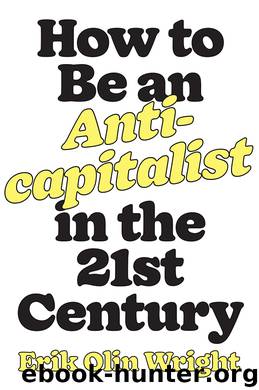How to Be an Anticapitalist in the Twenty-First Century by Erik Olin Wright

Author:Erik Olin Wright
Language: eng
Format: epub
Publisher: Verso Books
The social and solidarity economy
The social and solidarity economy is an umbrella term covering a range of economic activities and organizations that are anchored in communities, embody egalitarian and solidaristic values, and are committed to some kind of needs-oriented or social justice mission. Often the organizations within the social/solidarity economy are cooperatives, but they may be other kinds of enterprises: nonprofits, mutual societies, voluntary associations, community organizations, social enterprises (commercial firms with a strong social mission) or even churches. In some parts of the world, the social/solidarity economy overlaps with what is called the “informal economy,” economic activity that falls outside of officially recognized and publicly regulated economic activity. But the social/solidarity economy can also involve durable organizations with permanent staff.
Often the social/solidarity economy emerges in the context of poor and underserved communities as a survival strategy to fill gaps in social provision. When there is a severe economic crisis, as occurred in Argentina in 2000 and Greece in 2009, all sorts of social/solidarity economy activities proliferate: time banking and local currencies; community kitchens; DIY tool libraries; community gardens; caregiving exchanges; free clinics; and much more. However, the social/solidarity economy is not simply a response to marginalization and precariousness; it is also fostered by people trying to build economic relations on a more communitarian, needs-oriented basis. The Canadian province of Quebec, for example, has a vibrant social/solidarity economy that includes daycare centers, eldercare and disability care services, recycling, performing arts, affordable housing projects, makerspaces and a diversity of cooperatives. Activists involved in the social/solidarity economy generally see their work as building emancipatory enclaves within capitalism that enable people to live very different kinds of lives.
The space for the social/solidarity economy would almost certainly expand in a democratic socialist economy. UBI would not only help underwrite market-oriented cooperatives, but also make it easier for people to opt for nonmarket social/solidarity economy activities since the need to generate a livelihood within those activities would be greatly reduced. Furthermore, the social/solidarity economy may constitute the optimal way of providing certain kinds of services. Childcare, eldercare and disability care services are good examples. In principle, these services can be provided through four different kinds of processes: directly by the state, by profit-making market-based firms, by families, or by various kinds of organizations in the social/solidarity economy. In a democratic socialist economy, all four of these options would be available, but the social economy form of care services, underwritten by public funding, would likely be especially vibrant. The public funding embodies the egalitarian value of making the service accessible to all; the social/solidarity economy form of provision enhances the values of community and democratic participation.
Download
This site does not store any files on its server. We only index and link to content provided by other sites. Please contact the content providers to delete copyright contents if any and email us, we'll remove relevant links or contents immediately.
| Anarchism | Communism & Socialism |
| Conservatism & Liberalism | Democracy |
| Fascism | Libertarianism |
| Nationalism | Radicalism |
| Utopian |
The Secret History by Donna Tartt(19045)
The Social Justice Warrior Handbook by Lisa De Pasquale(12185)
Thirteen Reasons Why by Jay Asher(8887)
This Is How You Lose Her by Junot Diaz(6874)
Weapons of Math Destruction by Cathy O'Neil(6263)
Zero to One by Peter Thiel(5786)
Beartown by Fredrik Backman(5737)
The Myth of the Strong Leader by Archie Brown(5496)
The Fire Next Time by James Baldwin(5429)
How Democracies Die by Steven Levitsky & Daniel Ziblatt(5211)
Promise Me, Dad by Joe Biden(5141)
Stone's Rules by Roger Stone(5080)
A Higher Loyalty: Truth, Lies, and Leadership by James Comey(4948)
100 Deadly Skills by Clint Emerson(4918)
Rise and Kill First by Ronen Bergman(4777)
Secrecy World by Jake Bernstein(4740)
The David Icke Guide to the Global Conspiracy (and how to end it) by David Icke(4699)
The Farm by Tom Rob Smith(4502)
The Doomsday Machine by Daniel Ellsberg(4484)
